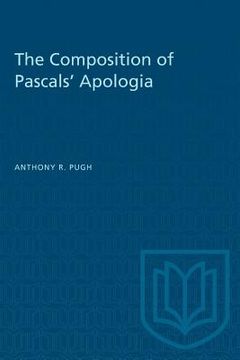Share
The Composition of Pascals' Apologia (in English)
Anthony R. Pugh
(Author)
·
University of Toronto Press
· Paperback
The Composition of Pascals' Apologia (in English) - Pugh, Anthony R.
Choose the list to add your product or create one New List
✓ Product added successfully to the Wishlist.
Go to My WishlistsIt will be shipped from our warehouse between
Monday, July 08 and
Tuesday, July 09.
You will receive it anywhere in United States between 1 and 3 business days after shipment.
Synopsis "The Composition of Pascals' Apologia (in English)"
Blaise Pascal, the force of whose intellect has never been in doubt, could have given us the most challenging apologia for the Christian faith that post-Renaissance man had known. He did devote several months to working on such a project, noting down his thoughts spontaneously and then classifying them, sorting out about half of his apologetic fragments into dossiers which represented embryonic chapters. He maintained that his principal claim to originality lay in this ordering of his thoughts. Yet he never revealed his plan, and unfortunately was interrupted in his work by illness and then death. Anthony R. Pugh has carefully examined Pascal's process of classification in order to determine his rigorous but subtle argument. Pascal systematically reduces the hostility of the unbeliever by showing the logical consequences of his position and by presenting different facets of the Christian faith. He is always aware that Christianity is not a position that can be reasoned and proved correct, although he believes that reason, properly used, will be profoundly satisfied with the fullness, complexity, and coherence of the Christian account of man. Professor Pugh discusses how Pascal's thinking gradually evolved during the years before he set down his ideas for a new kind of apology. It is possible to detect ways in which the plan itself grew in complexity. This shift in emphasis sheds unexpected light on the often disputed authenticity of Filleau de la Chaise's account of the apologies because he realized that he had set himself an impossible task, arguing that this theory in unsubstantiated by any known evidence, and that if Pascal did not complete his task, it was not because the problem had no solution but because he had resolved it to his own satisfaction once more he had visualized the complete design.
- 0% (0)
- 0% (0)
- 0% (0)
- 0% (0)
- 0% (0)
All books in our catalog are Original.
The book is written in English.
The binding of this edition is Paperback.
✓ Producto agregado correctamente al carro, Ir a Pagar.

